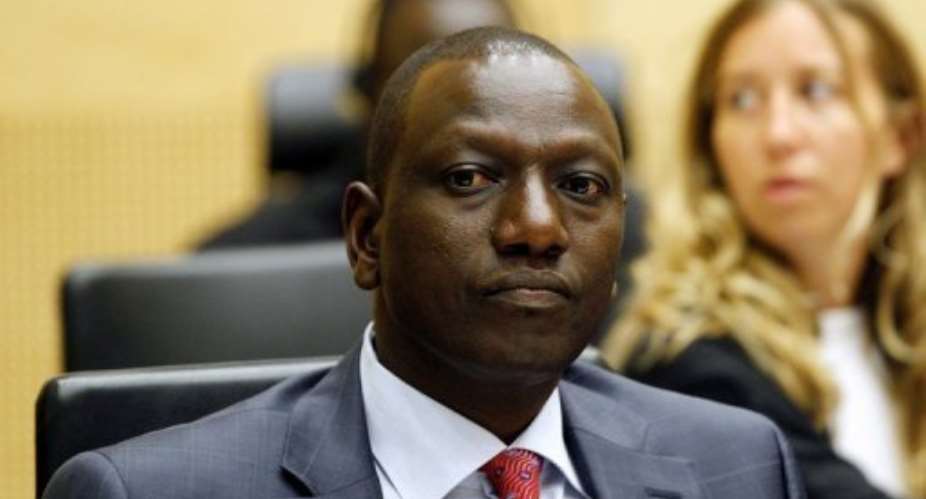THE HAGUE (AFP) - Two former Kenyan ministers were accused of planning deadly 2007-08 post-poll violence "long in advance" as they faced world crimes court judges Thursday.
Their defence in turn accused the Hague-based International Criminal Court's prosecutor Luis Moreno-Ocampo of not investigating the case properly before a hearing to decide whether charges against them should be confirmed or not.
"The crimes were planned and prepared long before the elections happened," Moreno-Ocampo said on the first day of hearing against former higher education minister William Ruto, Henry Kosgey and Joseph arap Sang.
Ruto, once seen as a potential presidential candidate in 2012, as well as former industrialisation minister Kosgey and radio executive Sang are facing charges of crimes against humanity for their role in Kenya's post-vote unrest which the prosecution said killed 1,133 people and displaced more than 663,000 others.
"Since at least December 2006, Henry Kosgey and William Ruto created a criminal plan to gain political power," Moreno-Ocampo said, while Sang helped by inciting supporters via radio broadcasts to attack opponents.
"Mr Kosgey and Mr Ruto held at least eight meetings in 2007," the prosecutor continued, "they provided weapons and phones and promised land to those participating in the attacks.
"They offered money to those who killed and those who burned," he said.
Ruto, 44, as well as Kosgey, 64 and Sang, 35, are supporters of opposition candidate, now Prime Minister Raila Odinga's Orange Democratic Movement (ODM) and are alleged to have targeted supporters of Kenyan President Mwai Kibaki after the disputed 2007 polls.
The hearings, during which prosecutors will try to convince the court they have enough evidence to go to trial, are scheduled to run until September 12.
A second set of hearings will start on September 21 for three other suspects, including Uhuru Kenyatta, son of Kenya's founding president and the country's finance minister.
Kenyatta was long seen as likely to run in next year's presidential election but he has refused to give up his ministerial post although his chances of running a campaign from the ICC dock look dim.
Ruto, for his part, was suspended from his ministry on unrelated graft charges last year and eventually dropped from the ministerial line-up altogether in August.
His group faces charges including murder, forcible transfer and persecution committed against perceived supporters of Kibaki's Party of National Unity (PNU) following poll results.
They are believed to have been part of a plan "targeting members of the civilian population supporting (Kibaki's) Party for National Unity (PNU), in order to punish them and evict them from the Rift Valley with the ultimate goal of gaining power and creating a uniform ODM voting block".
But Ruto's lawyer David Hooper told the three-judge bench "there has been a failure, a total failure, to investigate the exonerating circumstances in the investigation".
"I hope bench appreciates the deep frustration he (Ruto) is feeling. He is here solely because of a flawed investigation based on the over-reliance on a handful of witnesses."
Speaking to the court, Ruto himself later said "what happened in 2007 was a blow to many Kenyans but a bigger blow to me".
"Many people in my constituency who voted for me died in this violence," he said, adding he should not be tried before the ICC.
"What happened in Kenya in 2007 and 2008 was tragic, but let me say, two wrongs never add up to a right," Ruto said.
Kenya was plunged into violence after the December 27, 2007 general elections in which then opposition chief Odinga accused Kibaki of having rigged his way to re-election.
What began as political riots soon turned into ethnic killings targeting Kibaki's Kikuyu tribe.
They launched reprisal attacks in which homes were torched and people hacked to death in the country's worst violence since independence in 1963.
© 2011 AFP





 2024 election: Don’t be scared; we're ready to maintain law and order – Dampare ...
2024 election: Don’t be scared; we're ready to maintain law and order – Dampare ...
 NDC to officially outdoor Prof Jane Naana as 2024 running mate on April 24
NDC to officially outdoor Prof Jane Naana as 2024 running mate on April 24
 Power outages: Always give 3 days prior notice — PURC to ECG
Power outages: Always give 3 days prior notice — PURC to ECG
 NDC's quest to wrestle power from NPP goes beyond partisanship; it’s a national ...
NDC's quest to wrestle power from NPP goes beyond partisanship; it’s a national ...
 ECG board members slapped GHS5.8 million fine by PURC for failing to alert publi...
ECG board members slapped GHS5.8 million fine by PURC for failing to alert publi...
 I never left NPP, they 'sacked' me for attending Alan's programme; even a $100mi...
I never left NPP, they 'sacked' me for attending Alan's programme; even a $100mi...
 Fuel prices go up today
Fuel prices go up today
 Anti-gay bill: Your stance serves no purpose; either you actively advocate for t...
Anti-gay bill: Your stance serves no purpose; either you actively advocate for t...
 Tension brews as NPP Seattle clashes with national leadership over parallel chap...
Tension brews as NPP Seattle clashes with national leadership over parallel chap...
 Anti-gay bill: You've done nothing in Ghana to prove you're against LGBTQ+; ther...
Anti-gay bill: You've done nothing in Ghana to prove you're against LGBTQ+; ther...
